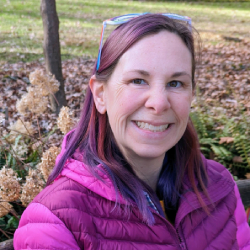2024 Candidate Rese Cloyd
 Rese (Emily Therese) Cloyd
Rese (Emily Therese) Cloyd
Associate Director, Fisheries and Wildlife
District of Columbia Department of Energy and Environment
Candidate for: ESA President-Elect
Since June 2022, I have served as the Associate Director, Fisheries and Wildlife, for the District of Columbia Department of Energy and Environment. As the leader of the state fisheries and wildlife division, I oversee biologists, educators, and administrative staff who manage and conserve the District’s fish, wildlife, plants, and ecosystems. As Director of the American Association for the Advancement of Science Center for Public Engagement with Science and Technology (September 2016 – June 2022), I led a team of science communication professionals in delivering training and fellowship programs, initiatives, and awards. At the U.S. Global Change Research Program (January 2007 – September 2016), I coordinated interagency working groups on ecology and carbon cycle science, then led the development and implementation of the public engagement and communication strategies for the Third National Climate Assessment and coordinated the author team for the NCA3 Decision Support chapter. As a 2006 Sea Grant Knauss Marine Policy Fellow, I led an effort to establish National Ocean Service priorities for research and development of estuarine, coastal, and ocean ecosystems models. I have a Master’s in conservation biology from SUNY Environmental Science and Forestry, and a Bachelor’s in plant biology from the University of Michigan. I currently serve on ESA’s Professional Ethics and Appeals Committee (since August 2019) and previously served as a Governing Board Member at Large (August 2016 – August 2018) and Chair of the Policy Section (August 2013 – September 2015).
What interests, experiences or skills would you bring to this position?
My career path, which includes working in and collaborating with Federal and state government agencies, academia, scientific societies, and community organizations, has prepared me for leading ESA as it seeks to connect and support ecologists in their diverse career journeys. I have conducted ecological research in Great Lakes wetlands and urban ecosystems, studied the ways in which science is communicated to and used by policymakers and how scientists and communities equitably co-produce actionable research, and coached scientists and engineers in engaging the public. During the pandemic, I returned to (virtual) school and earned an Executive Certificate in Nonprofit Leadership and Management from the University of Notre Dame, building on my professional and volunteer experience and helping me grow as a leader. I am also an avid outdoorswoman and champion for connecting people and nature through recreation. I’ve worked as a Girl Scout camp counselor and naturalist and a natural history museum docent, serve on the Board of the Recreational Boating and Fishing Foundation (since February 2023), am on the Board of (January 2019 – December 2021 and January 2023-present) and coach for (since April 2018) the DC Dragon Boat Club, and with my wife am (slowly) section hiking the Appalachian Trail.
How would you support ESA’s mission? How would you plan to promote DEIJ in ESA membership and activities if elected?
ESA membership has benefited me at every step of my career; as a leader in ESA, I would continue to support student and early career ecologists’ participation in ESA leadership, collaborate on programs that provide opportunities for ecologists to explore and connect across career trajectories, and encourage partnerships with students and professionals in fields that intersect with ecology, particularly as our local and global communities seek to understand and respond to complex threats like climate change. ESA has made progress in lowering barriers to participation in the field and encouraging ecologists’ engagement with the communities where they practice, but more work is needed to ensure our Society supports and serves the needs of larger society in fostering a thriving planet. Continuing to make space (and creating additional space) for community members to participate in our meetings and efforts such as the SEEDS and EcologyPlus programs, affinity groups (sections and chapters), and Diversity Committee provide a strong foundation for ESA’s DEIJ efforts. As a leader in ESA, I would increase efforts to engage those who are not yet active in these efforts, seeking to understand what has kept them from supporting this work and finding pathways for them to join it.